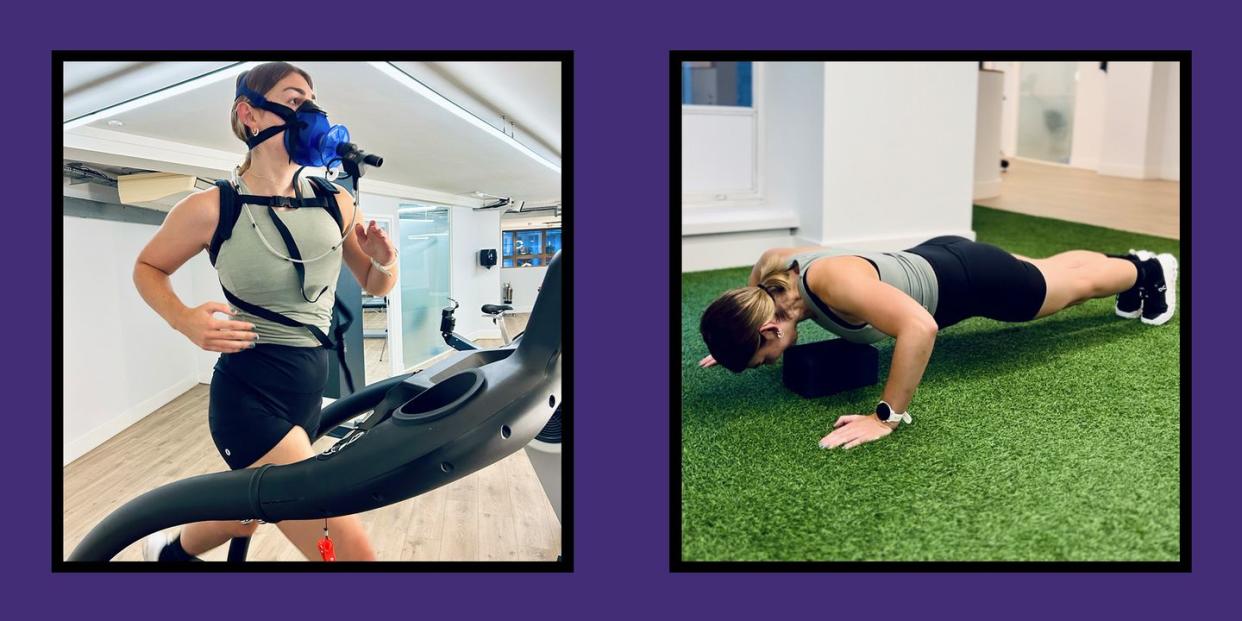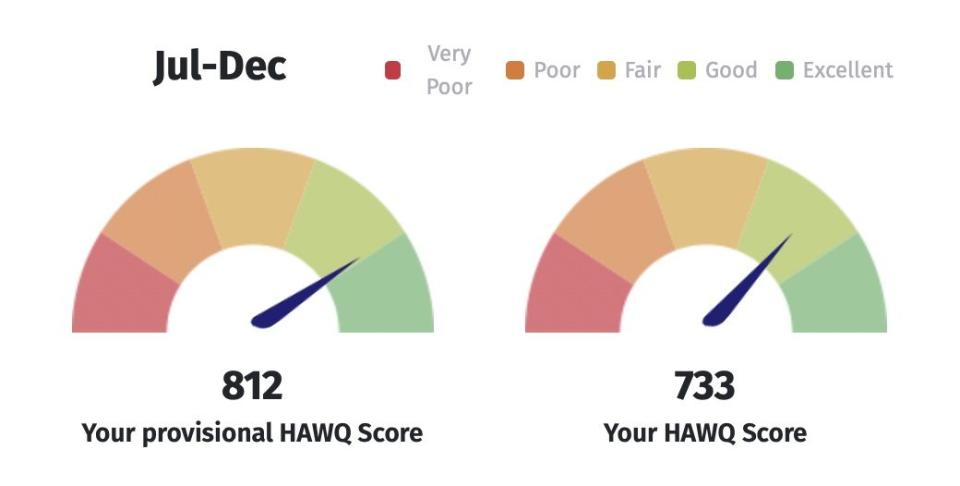'I got given a "credit score" for my health – as an 8x marathoner, here's what it's taught me about my training'

As a fitness journalist who’s ran eight marathons in the past few years, I like to think I’m in pretty good shape. But as every runner knows, the path to race day doesn’t always run smoothly – especially when you’re juggling a busy job, family and social commitments..
I’ve had my fair share of niggles crop up along the way – earlier this year it was a case of glute tendinopathy, which (*touch wood*) working with a physio and regular strength training has since kept at bay.
And, of course, running a marathon isn’t just about the running. You’ve also got to factor in things like good nutrition and sleep for your recovery. These days, there’s a plethora of tech you can use to help with this – GPS watches, heart rate monitors and even glucose trackers. But unless you're a data fiend it can be difficult to interpret all this information and get an overall picture of what condition your body – and mind – is really in.
So, two weeks out from running the New York City Marathon, and with a classic case of maranoia creeping in, I came across HAWQ – essentially a credit score calculator for your health.
I was curious to see how my score would fair and whether it could teach me anything of value to help with my training. So, in the name of journalism, I headed to see the team at Stone personal training in London to be put me through my paces.
How it works
HAWQ combines in-person testing with a lifestyle analysis to provide you with a health score (called a 'HAWQScore') that works around five key pillars: body, mind, movement, nutrition and sleep.
I took on HAWQOne, designed for individuals, but HAWQTeams is available for employers looking to improve their teams’ wellbeing (HAWQSport, I’m told, is a new service coming soon for professional, semi-professional and everyday athletes, analysing strength, power, skill, cardiovascular agility and mobility).
At HAWQ’s HQ, I was led through a series of assessments. These are all clinically reliable and validated tests, including blood pressure, fasting glucose, memory (testing for inhibition and visuospatial working memory), flexibility, balance, strength and VO2 max. The whole process took about an hour.
Afterwards, I completed a questionnaire covering areas such as my sleep, movement, stress levels, and eating, drinking and exercise habits. All of this was then combined to provide me with my ‘health credit score’, which, just like a traditional credit score, is rated out of 1,000.
‘Most people score between 400-600,’ says Livvy Probert, co-founder and head of science at HAWQ. ‘If you hit 500, you’re meeting minimum recommendations for key health markers. And a score of 800 or more is really quite hard to get unless you’re in the best mental and physical state of your life.’
You also get an individual score out of 10 for body, movement, sleep, mind and nutrition.
Unpacking the results
So…*drum roll*…how did I do? My HAWQScore came in at 733 (after the clinical tests and lifestyle assessment had been combined), which, naturally, I was pretty chuffed about. But that’s not to say there isn't room for improvement.

As a runner, I was most interested in my VO2 max results – a measure of the amount of oxygen your body can utilise during exercise. Knowing your VO2 max is a good measure of fitness, particularly for endurance athletes, as well as being one of the best predicators of longevity.
To measure, we used a VO2 master analyser. This is a face mask with a gas analyser that directly measures gas consumption. It takes a sample of the air around you and what you breathe out. From there, it works out how much oxygen is used and how much CO2 you produce.
My VO2 max came out at 49ml/kg/min, which means I have ‘excellent cardiovascular fitness’, says Probert, ‘particularly in terms of fat utilisation and low-intensity efficiency’ – all of this is ideal for someone who is about to take on an endurance event like a marathon.
But the test provided more than just an ego stroke. Turns out, I slightly hyperventilate at rest and during exercise, breathing more quickly and less deeply than is ideal. While this might not directly affect my performance, it could be hindering my perceived effort levels and mean I’m not getting the most out of my training sessions – indirectly limiting performance. Probert suggested some breathing exercises, including two to three minutes of box breathing after a run. This involves breathing in slowly for four seconds, holding your breathe for another four seconds, before exhaling through your mouth for four seconds. The idea is that it helps to return the breath to a normal rhythm.
The test also revealed that even in zone 2 (working at 65-75% of my maximum heart rate), I burn 560 calories per hour. This is useful information for an endurance runner, as I can use it to guide my fuelling strategy going forwards.
Next up, my blood pressure, resting heart rate, waist circumference and fasting glucose all placed me in the lowest risk category for poor health outcomes, so there weren't any causes for concern here. But while I’m active in terms of exercise, like a lot of people, I spend several hours sitting down at a desk. Finding ways to break up my sedentary time is definitely something to focus on going forward.
Strength is the only area where I scored below average, but I also found it to be one of the biggest limitations of the assessment. Strength was measured by the amount of press-ups I could complete, so my lower body strength wasn’t taken into account (and this makes up about 70% of my strength training regime). Overall, this felt pretty reductionist and probably not a true reflection of my current condition.
Nutrition, sleep and stress were less of a focus for me, as they’re areas I scored well in, but for a lot of runners I can imagine some big gains to be had in these areas. It was a good reminder to focus on marginal gains where possible though: limiting artificial light exposure before bed (guilty as charged) and making sure I'm aiming for a high carb snack 1-2 hours before a run.
Final verdict
For everyday athletes like myself wanting to get to know their data a little better, HAWQ is a useful way to bring everything together in one place and spot any tweaks that can help you get more from your training. But even if you don't class yourself as a 'runner', from a holistic health perspective it's a helpful tool for anyone wanting to increase their knowledge and awareness of their health – especially if you're just starting out on your fitness journey.
However, it's important to remember that tests like HAWQ are designed to provide an overall picture of your health and aren't without their limitations. They rely on you honestly reporting things like stress, sleep and sedentary time for one (the latter of which is notoriously common for people to underestimate, says Probert). Then there's the reductionist nature of strength, balance and even memory tests.
Plus, there's the price to consider. A full HAWQ assessment (including an hour of testing and a 30-minute follow-up session) is £225. A VO2 max test on its own is £150. It's a budgetary consideration for sure, but like anything when it comes to your health and fitness, it's up to you what price you want to put on it.
For me, a 'health credit check' provided some much-needed reassurance ahead of the New York Marathon – and the VO2 Max test in particular has given me things to focus on going forward that could improve my performance in time. Will I be returning when HAWQSport launches? Watch this space...
You Might Also Like


